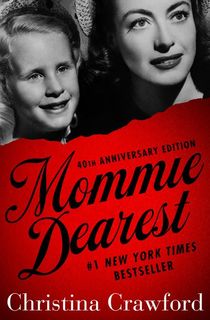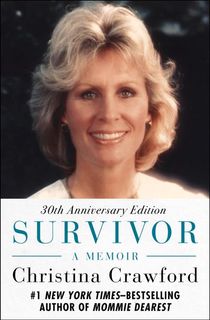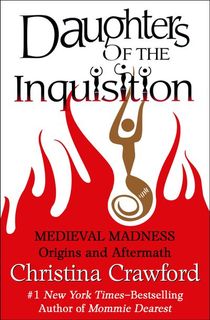In 1978, Christina Crawford, the adopted daughter of Joan Crawford, shocked readers everywhere when she released her memoir that recounted the abuse she faced at the hands of her mother. From Joan’s alcoholism to physical abuse, Christina revealed her terrifying childhood and ignited the conversation around child abuse in America.
November 1, 2018 marks the 40th anniversary of the publication of Mommie Dearest. To commemorate the milestone, Christina Crawford has written a new introduction to the book, which is now digitally available as an ebook for the first time ever—along with its sequel, Survivor, and “herstory” book, Daughters of the Inquisition. The author opened up to Early Bird Books about why the classic still resonates with people, what she hopes new readers will take away from it, and how she’s continuing to tell her life story.
Mommie Dearest was a cultural and literary phenomenon that has become a classic. Why do you feel that it still resonates with so many people 40 years later?
Mommie Dearest is now a part of the American language and culture because years ago it was the first book in modern times to unmask an unspoken set of secrets. It shattered the taboo of silence that existed. More importantly, the truth was told through the voice of a child coming from a home of perceived wealth and power. It turned the fantasy world of fame and celebrity upside down and shocked a lot of people. However, many people in the movie business knew the truth, and were too afraid of personal consequences to speak up or to stop it.
Mommie Dearest brought awareness to and opened up the conversation about child abuse in the late 1970s. How do you feel that this issue has evolved, or not, in the years since?
Before the publication of Mommie Dearest, there was no meaningful public conversation about child abuse, family violence, or abuse by clergy or coaches. It was a shameful topic. Additionally, when the mistreatment of children was addressed during that time, it was seen as a problem predominately associated with the economically disadvantaged and not as impacting a larger group of people.
Nothing could be further from the truth. Family violence, learned at home, spreads out into all facets of everyday life, all over our country. It impacts schools and a child's ability to learn. It can have a serious impact on long-term health and public safety, and is spread from generation to generation, family to family.
According to recent statistics, seven million American children a year are abused and neglected. The majority of children who die as a result of this abuse are under the age of five. Though progress has been made in terms of reporting of physical abuse, the issue of severe neglect has risen.
We are addressing the abuse, we have changed the laws...but the problem still persists.
What made you want to tell your story, and how do you think it has affected those who have read it?
When the language of my mother’s will was read to me I was stunned. Not because I ever believed there would be any inheritance money coming my way, because I had been earning my own living for many years, but because of the unmistakable implication that my brother and I had done something unspeakably wrong. It was a terrible injustice done to both of us.
So, I returned home after the funeral and decided to write a journal of my childhood, setting the record straight for my own benefit. Never in a million years did I think it would be a book, nor that it would be published. During all our years growing up, no one had been willing to help us, nor even believe us, so why would this time be different? In addition, I was now a private person; I had returned to college, gotten a masters degree, and then gone to work in corporate America. I had no entertainment connections, no friends in publishing.
The great irony is that the original publishers did not know the tiger they had by the tail!
Suddenly, millions of people had someone on their side for the first time to defend, advocate, and understand what they had experienced in solitude and terror. That is still true today and is the legacy of Mommie Dearest.

Joan and Christina Crawford
Photo Credit: Christina CrawfordMommie Dearest is now being offered in ebook—a format that didn’t exist when the book was originally published in 1978. How do you think you’ll reach a new audience of social media users and ebook readers?
It is thrilling that Mommie Dearest is now an ebook. It is the furtherance of a process I began in 1998 with the 20th Edition, which was published by Seven Springs Press, because I wanted to make sure that each new generation of readers would be able to access the original work. Now, there is a new generation of readers who use social media and ebooks as their means of information gathering. Welcome!
Is there anything that you’d like new readers to know before they begin Mommie Dearest?
If people believe they know Mommie Dearest because they've seen the movie, think again! And if readers have never seen the movie, then they are in for an epic personal journey. In any case, preconceptions aside, enjoy an American classic.
Survivor, your fascinating sequel to Mommie Dearest, covers the ten years immediately after the publication of Mommie Dearest. Can you tell us about this time and why you decided to write a sequel?
In 1981, three years after the publication of Mommie Dearest, I suffered a nearly catastrophic stroke, from which no one expected me to recover. At the age of 42, both physical and mental capabilities had been taken away from me. When it became clear that I was actually going to survive, and after weeks in hospital and rehabilitation units, the doctors sent me home with only minimal expectations for a return to normalcy, even with intensive physical therapy, since they never expected me to live in the first place!
After a while, it became clear to me that my "near death" experience was actually a chance for a new life. That new life required years of reprogramming my body and brain to function again, but this time it would be in the pursuit of spiritual connection in an entirely new way.
After four or five years spent in this recovery, most of the money I had earned was gone, as was my marriage. I even came very close to losing my house.
One day, quite out of the blue, a thought came to me that I should try to write down my rather mystical return. Slowly, because I write by hand, the journey of Survivor began to unfold.
How were you able to move past the hardships you’ve faced?
I really don't know how to explain exactly how I have traveled from "then" to "now.” Partly because there has not been a "roadmap," and partly because it has been evolving over so many years. In my books, I have tried to share the process, but everyone's life is different and no one size fits all.
I do know that each person has their own journey to live, their own special purpose to honor, and that it has nothing to do with wealth or status, with race or gender.
Spiritually, I believe that depression and the horrors that go with it are the symptoms that one has lost sight of the purpose of the journey. And, hard as it may be to believe, the only remedy I have found, that is equally available to each of us, is the daily practice of Gratitude.
Daughters of the Inquisition, your “Herstory,” is very different from your previous books. Can you elaborate on why you were drawn to writing this book?
Yes, I realize that my book Daughters of the Inquisition may seem as though it is a departure from my other work. But actually, it evolved from my spiritual journey writing Survivor, even though there was one book (No Safe Place, The Legacy of Family Violence) in between.
During my spiritual recovery journey, I was surprised that I was not finding female role models, and I wondered why that was. My research into western religious history brought me face to face with the Inquisition. But most of those books were written from a male majority point of view.
The Inquisition changed the course of western civilization. And, in my opinion, women are still paying the price even today. The real tragedy? Most do not know why, or what it is that we collectively have lost. It is not taught; it is not a point of reference in politics or governance.
That’s is why I wrote the book. I am so proud of the final result, and I hope it touches the hearts and minds of readers all over the world because, to the best of my knowledge, there is nothing like it anywhere else!
Related: Christina Crawford on Why It's So Important to Remember "Herstory"
You are writing and producing a stage musical adaptation of Mommie Dearest. What do you hope to achieve by bringing your story to life on the stage?
My latest project has been to write a musical adaptation of Mommie Dearest. With composer, lyricist, and friend David Nehls, it has now been created as a two-act musical for the theater. Since I began my career as an actress, my first love was the theater; it is a joy to see this work come alive.
In September 2017, we did what is called a 29-Hour Reading of the musical in New York. That was the first time David and I heard the music sung by professional actors all the way through. What an amazing experience that was for both of us. Director Joe Barros was so skillful that each day the piece evolved was like watching magic.
Now we are working on the next stage of development, which leads to actual production. There are various steps to climb, including finding a lead producer and funding, but we believe it will happen.

(From left to right): Christopher, Joan, and Christina Crawford
Photo Credit: Christina CrawfordHow has your experience as an actress helped with the stage adaptation?
My experience as an actress helped enormously during the time I was writing (and re-writing) the script for the musical. I could hear the spoken lines and envision the scenes, how the pacing needed to go, where humor could fit, and even the basics for lyrics. I also created an entirely new character just for the musical, and everyone loves him. Of course it is a challenge, but one I have really enjoyed.
Once composer David Nehls came on board and the music began to flow, a whole new world opened up to me. I think it is rare in a career as long as mine—almost 60 years—to be gifted with an entirely new professional experience. It’s awesome!
How will the new stage adaptation be different from the 1981 film adaptation of the book?
With the exception of the title and the names of main characters, Mommie Dearest the Musical has no resemblance to the movie, which I did not write.
Perhaps most importantly, the musical sees the world through the eyes of the brother and sister relationship as they struggle to survive and grow into adulthood. Over the three decades the musical covers, beginning with the golden years of MGM studios, it portrays the glamour and sex of the movie years, the hidden family violence, courage and love between a brother and sister, and even some 1950s and ‘60s rock & roll. It is a musical for all audiences.
Are you working on any other projects right now?
Regarding Mommie Dearest the Musical, we are now planning for a larger New York Equity workshop in the spring, which will include choreography by director Joe Barros and bring us closer to being ready for full production. Each step requires more people and more funding, since we are still looking for a lead producer and major investors, but we believe it will happen.
This winter, my plans are to write the last in what will be the trilogy of my memoirs, which at the moment ends with Survivor. The final book will begin with leaving my home state of California in the early 1990s, traveling briefly to Maryland and Washington DC, and then spending 20 years in beautiful rural north Idaho. The physical journey evolved into a long spiritual vision quest on land originally part of the Coeur D'Alene reservation. Truthfully, I had no idea what amazing experiences were in store for me—amazing, funny, frightening, physically demanding, lonely, and much, much more. Stay tuned!
About the Author

Christina Crawford is the #1 New York Times–bestselling author of the memoirs Mommie Dearest and Survivor, as well as the women’s history book Daughters of the Inquisition. Crawford graduated magna cum laude from the University of California, Los Angeles, after spending nearly fourteen years as an actress in television, theater, and film. She received her master’s degree in communication management from the Annenberg School at the University of Southern California. Crawford has been a lifelong advocate of issues for social justice, from the early days of child abuse prevention and family violence intervention to issues of the rights of women across the world. She lives in Idaho, where she continues to write and pursue creative project. You can follow Crawford on Facebook.
Featured image: Christina Crawford
Editors' Note: This interview was originally published on November 17, 2017.



